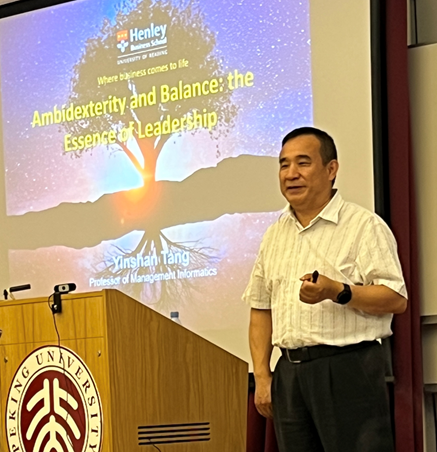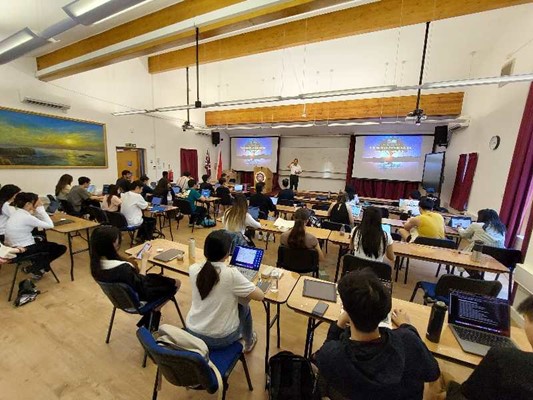On the sunny summer’s afternoon of 14 June 2023, PHBS-UK warmly welcomed Professor Yinshan Tang, Professor of Management Informatics, and Vice-Dean of Henley Business School, University of Reading. Professor Tang obtained his PhD from Imperial College in medical entomology and parasitology in 1988. He subsequently worked for a business consultant company in the UK. Professor Tang joined University of Reading in 2004 and became Vice-Dean of Henley Business School and a full professor in 2013. His research is mainly multi-disciplinary where he has been trying to find the common fields among biology, management, and philosophy. He is especially interested in the topics of human behaviour, culture evolution, management, Chinese philosophies, international relations. Thus, it is with great pleasure and honour that we had a speaker of such distinguished status giving a seminar on the topic of, “Ambidexterity and Balance: the Essence of Leadership”.

A company’s ability to execute today’s strategy while developing tomorrow’s arises from the context within which its employees operate. In his seminar, Professor Tang focused on a key management and leadership issue related to decision making while performing leadership roles. He highlighted to the students that in order for a company to succeed in the long term, it needs to master both adaptability and alignment — an attribute that is sometimes referred to as ambidexterity. However, the trouble is, as Professor Tang explained, it is difficult to find the right balance between adaptability and alignment. This is because, as Professor Tang went on to explain, when a company focuses too much on alignment, the short-term results may look good. However, changes in the industry will blindside the company sooner or later. Similarly, too much attention to the adaptability side of the equation would mean that the company is building tomorrow’s business at the expense of today’s. Thus the crux of the seminar is how to balance the two.

Professor Tang explained that in order for the organisation to succeed, managers need to know how to lead with ambidexterity. Managers need to know how to deal with tasks and how to deal with people. The essence of good management is that managers should be capable in delivering the task, know their position in the environment and act at the right moment. With respect to employee management, managers should always honour their words, be giving, and maintain the order of the organisation. Management makes or breaks a business. Professor Tang raised a very important point that leadership should start low – managers should know what is happening on the ground. Respect employees and the business will grow. Professor Tang impressed on the audience that adaptability and alignment in management is the essence of good leadership and a good leader.
It was an intriguing seminar and the staff and students truly appreciate Professor Tang sharing his knowledge and experience on leadership. We thank Professor Tang for his time and we certainly hope that we would have the opportunity to learn more about management and leadership from him in the future.

